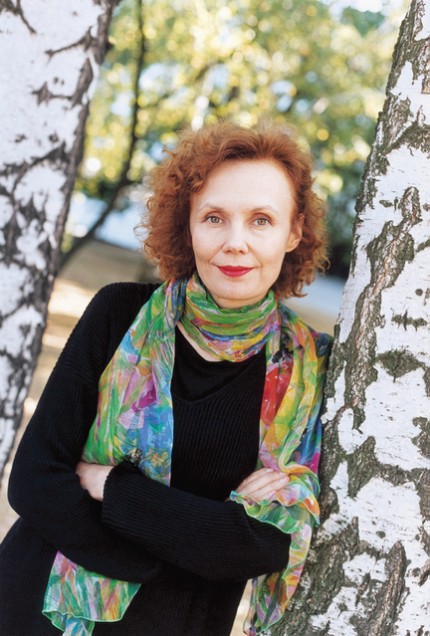Saariaho’s luminous work a clear highlight at MusicNOW finale

MusicNOW’s final program of the season, presented Monday night at the Harris Theater, was in the familiar mode of recent years with a lineup heavy on electronica pieces and distinctly uneven results.
The clear highlight of the evening was Trois rivieres by Kaija Saariaho, which continued the Chicago Symphony Orchestra’s month-long “Rivers” festival.
Trois rivieres (1994) is an early work, scored for four plugged-in percussionists who play a bewildering bestiary of instruments. (CSO principal Cynthia Yeh took the audience on a tour of the instrumental menagerie in a video introduction.) The four players are also required to recite excerpts from the poem “Moonlit night on the river,” by Li Po (in a French translation) while performing simultaneously.
In lesser hands, the spoken poetry and vast percussive ordnance would seem like gimmicky overkill. Yet the Finnish composer remains the most acute and subtle musical colorist of our day. In three deftly contrasted sections, Saariaho moved from her characteristic high luminous crystalline textures, to uninhibited drumming and a powerful rhythmic intensity. Yet the music never becomes coarse and there is a striking textural clarity and an array of varied hues throughout, even with the electronics, instruments and voices in full cry. All credit to the four hard-working soloists (Yeh, Eric Millstein, Jacob Nissly and Ian Ding) whose expressive vocalizing—from hushed whispers to shouting, reflecting the instrumental dynamics—was as virtuosic as their percussion playing.
Noticing the dearth of contemporary music for violin and cello, composer Christopher Theofanidis decided to do something about it. The result is his Summer Verses (2009). Cast in five movements, this user-friendly work can be performed with any number of the self-contained sections in any sequence. Violinist Yuan-Qing Yu and cellist Kenneth Olsen opted for the first three movements performed in order.
Summer Verses is crafted with Theofanidis’s usual skill, the three movements segueing from a kind of astringently syncopated country fiddling to pizzicato display—with echoes of the scherzo of Tchakovsky’s Fourth Symphony—and a kind of see-sawing Old English chaconne feel in the third, and here final, section. Theofanidis succeeds admirably in his goal of reconciling solo display within a Baroque concerto grosso sensibility. One could imagine the pizzicato movement making a greater impact at a faster speed and with more fiery playing, but CSO members Yu and Olsen’s polished and superbly committed playing made a fine case for this music.
Mason Bates, the Chicago Symphony’s co-composer-in-residence, is having a busy week with his Liquid Interface performed by the CSO (the final concert is tonight) and Monday’s MusicNOW event offering the world premiere of Bates’ Difficult Bamboo.
Scored for Pierrot Lunaire sextet (flute, clarinet, violin, cello, piano and percussion) the 20-minute work, in the composer’s words moves from “eerie minimalism to frenetic maximalism,” with Cliff Colnot conducting the six players.
Bates’ patented style is familiar by now with its drumming crescendos, grab-bag populism, gizmo electronics and dashes of jazz, rock and, here, stride piano.
There are fleeting pages of an attractive and earnest lyricism that descend from the American Romantic tradition. But I confess that each new Bates piece I hear tends to show his limitations as a composer of serious music in larger forms. Though it dispenses with his usual electronica, I found Difficult Bamboo similarly barren and reliant on superficial note-spinning, with little depth or substance beneath the busy surface and populist elements. Centered—fixated—on rhythmic insistence, Bates makes little of the color and scoring possibilities of the Lunaire instrumentation, and the musicians’ shout at the end—something about the difficulty of landscaping in California—feels tacked on for effect.
At least Marcos Balter’s Live Water has the virtue of brevity at just six minutes. Scored for amped-up viola and electronics, the work is inspired by Clarice Lispector’s novel The Stream of Life and its theme of the inability of language to express genuine meaning. Weijing Wang was a dedicated soloist, yet the gestural qualities of the scratchy amplified viola part against electronic whispered voices and celestial shimmering—failed to cohere.
Posted in Performances




